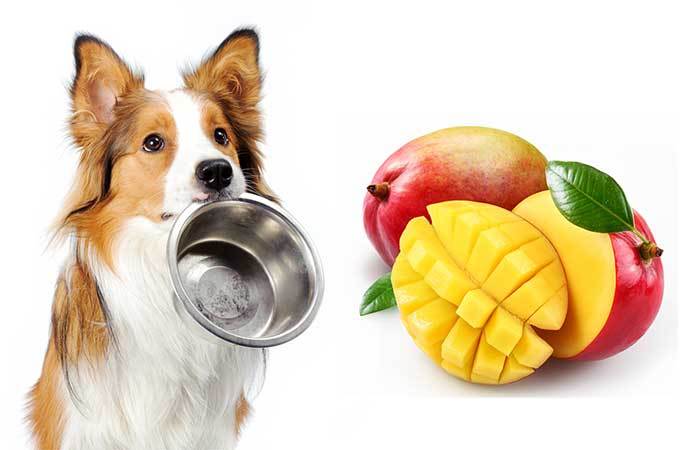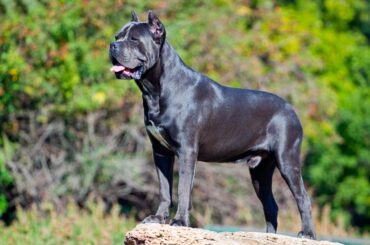Yes, dogs can eat mango, Yes!!! Dogs Eat Mango but it should be given to them in moderation and with certain precautions. Mango is a fruit that is safe for dogs to consume, and many dogs enjoy the taste. Mangoes are a good source of vitamins A, C, and E, as well as fiber. Reason why we put up this article on Dogs Eat Mango.

However, there are a few things to keep in mind when feeding mango to your dog:
- Remove the pit: The pit of the mango contains a large seed that can be a choking hazard and may cause intestinal blockage if swallowed. Make sure to remove the pit before giving mango to your dog.
- Moderation: While mangoes are generally safe for dogs, they are also high in sugar. Too much sugar can lead to gastrointestinal upset or even weight gain. Therefore, it’s best to offer mango as an occasional treat or snack, rather than a regular part of their diet.
- Allergies: Some dogs may be allergic to mangoes, just as humans can be allergic to certain foods. If your dog has never had mango before, it’s a good idea to introduce it gradually and observe for any signs of allergic reactions, such as itching, redness, or digestive issues. If you notice any adverse reactions, discontinue feeding mango to your dog.
- Preparation: Before giving mango to your dog, make sure to peel the skin and remove any potential irritants, such as the fibrous strands. Also, cut the mango into small, bite-sized pieces to make it easier for your dog to chew and digest.
Remember, it’s always a good idea to consult with your veterinarian before introducing any new food into your dog’s diet, especially if your dog has any existing health conditions or dietary restrictions.
The Benefits of Mangos for Dogs
Mangos are a delicious tropical fruit that many humans enjoy, but can dogs also benefit from consuming mangos? While mangos can be a healthy and safe treat for dogs in moderation, there are a few important things to consider. Here are some potential benefits of mangos for dogs:
- Vitamins and minerals: Our Number Benefit Dogs Eat Mango is because Mangos are rich in essential nutrients such as vitamin C, vitamin A, vitamin E, and various minerals. These can contribute to the overall health and well-being of dogs, just as they do for humans.
- Antioxidants: Mangos contain antioxidants, including beta-carotene, which can help neutralize harmful free radicals in the body which is also a beneficial factor why Dogs Eat Mango. Antioxidants are beneficial for the immune system and can potentially reduce the risk of certain diseases.
- Fiber content: Mangos are a good source of dietary fiber, which can support digestive health in dogs; Dogs Eat Mango. Adequate fiber intake can help regulate bowel movements and prevent constipation.
- Hydration: Mangos have a high water content, which can contribute to hydration in dogs. This can be especially beneficial during hot weather or for dogs that struggle to drink enough water; Dogs Eat Mango.
However, it’s important to keep in mind the following considerations when feeding mangos to dogs; Dogs Eat Mango:
- Moderation: While mangos are generally safe for dogs, they should be fed in moderation. Too much fruit can cause stomach upset or diarrhea in dogs due to their high sugar content. Additionally, dogs should never consume the pit or seed of a mango, as it can pose a choking hazard or cause intestinal blockage.
- Allergies: Some dogs may have sensitivities or allergies to fruits, including mangos. If you’re introducing mangos to your dog’s diet for the first time, start with small amounts and monitor for any adverse reactions such as itching, vomiting, or diarrhea.
- Preparation: Before offering mangos to your dog, make sure to peel the fruit and remove the pit. Mango skin and pit are not safe for dogs to consume and can cause digestive issues or blockages.
- Consultation: If you have any concerns about introducing mangos or any other new food to your dog’s diet, it’s always a good idea to consult with your veterinarian. They can provide guidance based on your dog’s specific needs and health conditions.
Potential Health Concerns of Mangos for Dogs
Mangos are a delicious tropical fruit enjoyed by many people, but when it comes to dogs, there are a few potential health concerns to consider. While mangos themselves are not toxic to dogs, there are a few factors to keep in mind:
- Digestive Issues: The high fiber content in mangos can cause gastrointestinal upset in some dogs. Eating too much mango or consuming it too quickly may lead to symptoms such as diarrhea, vomiting, or an upset stomach.
- Obstruction Hazards: The pit or seed of a mango can pose a choking hazard or cause intestinal blockage if ingested by a dog. It’s important to remove the pit and any hard, non-digestible parts before offering mango to your dog.
- Allergic Reactions: Dogs, like humans, can be allergic to certain foods. While mango allergies are relatively rare in dogs, they can occur. Signs of an allergic reaction may include itching, redness, swelling, hives, or difficulty breathing. If you suspect your dog is having an allergic reaction, contact your veterinarian immediately.
- High Sugar Content: Mangos are naturally sweet and contain a fair amount of sugar. Feeding excessive amounts of mango to your dog can contribute to weight gain and potentially lead to other health issues, such as diabetes or dental problems. Moderation is key when it comes to sharing mango with your furry friend.
- Pesticide Exposure: Mangos are often treated with pesticides to protect the fruit during cultivation. It’s crucial to wash the mango thoroughly before giving it to your dog, as the residues from these chemicals can be harmful if ingested.
If you decide to offer mango to your dog as an occasional treat, make sure to do so in moderation and take precautions to prevent any potential health risks. Always remove the pit, skin, and any non-edible parts, and observe your dog for any adverse reactions. If you have concerns or questions about your dog’s diet, it’s best to consult with your veterinarian for personalized advice.
Can Dogs Eat Mango Skin?
While dogs can eat mango flesh in moderation; Dogs Eat Mango, it is generally recommended to avoid feeding them mango skin. The skin of a mango is tough and difficult for dogs to digest. It may also pose a choking hazard or cause an obstruction in their digestive system.
Additionally, mango skin contains urushiol, which is a compound found in poison ivy and poison oak. While the concentration of urushiol in mango skin is much lower, some dogs may be sensitive or allergic to it, leading to skin irritations, gastrointestinal upset, or other allergic reactions.
READ ALSO:
- Can Dogs Eat Celery? 6 Exquisite Benefits of Celery for Dogs
- Can Dogs Eat Pineapple? 5 Benefits of Pineapple for Dogs | PetsWealth
- 10 Best Natural Dog Food For Healthy Living And Nutrients
- 10 Top Best Dog Food Brands And The Composition There
If you want to share mango with your dog, it’s best to remove the skin entirely and only give them small amounts of ripe mango flesh. Make sure to remove the pit as well, as it can be a choking hazard and may cause intestinal blockage.
As always, it’s a good idea to consult with your veterinarian before introducing any new foods to your dog’s diet, including fruits like mango. They can provide personalized advice based on your dog’s specific needs and health conditions.
In conclusion, mangos can offer some nutritional benefits for dogs when fed in moderation. However, it’s important to consider the factors mentioned above and consult with a veterinarian if you have any concerns or questions about your dog’s diet.




